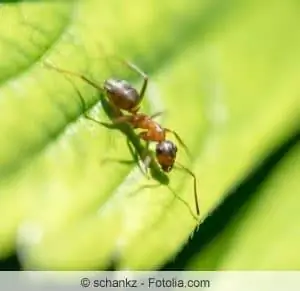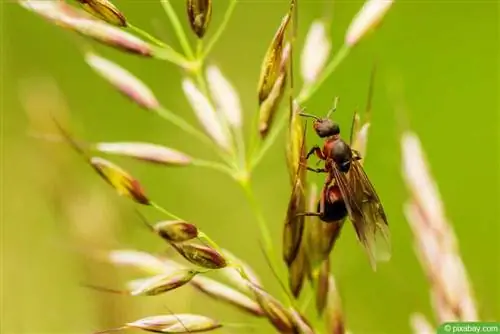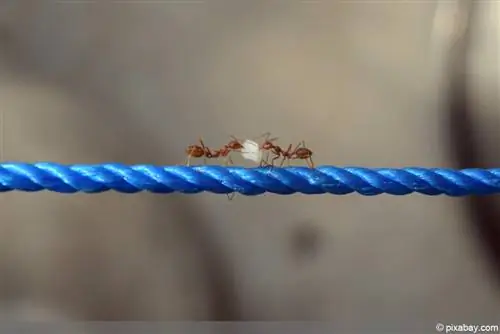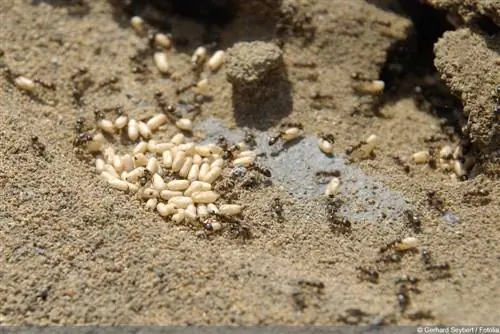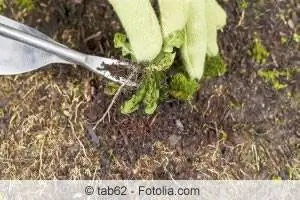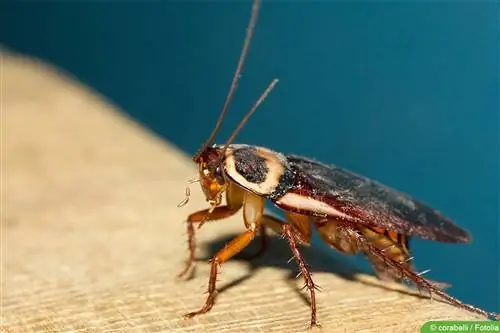- Author admin caroline@plants-knowledge.com.
- Public 2023-12-17 03:39.
- Last modified 2025-01-24 12:45.
With the first rays of sunshine, the ants arrive and immediately start looking for food. Ants usually build their nests outside. However, if they are looking for food, they can also get into the apartment through leaks in the house, windows or doors. They mark their path with scents, creating a so-called ant trail. There are numerous ways to combat them in the garden and in the home, but also preventive measures to prevent them from getting into the house in the first place.
Relocating instead of killing
If ant nests become rampant in the garden, the animals do not necessarily have to be killed; they can also be moved. It is important to catch the queen too, because ants follow their queen everywhere. To relocate, take a flower pot, stuff it with wood shavings or straw, both of which are best moistened, and place it over the nest. It stays there for a few days so that the animals can move into the container. It can then be moved to a more suitable location using a shovel or spade. However, this should be between 10 and 20 cm away from the old location, otherwise the ants would easily find their way back.
Good success with diatomaceous earth
Diatomaceous earth is a sedimentary rock available in powder form that consists predominantly of fossil diatoms. It can be used in the garden and in the house. If they come into contact with this powder, the animals die within a short time. In the garden, spread a thin layer of it on the nests and along preferred paths. To prevent ants from crawling up trees, this product can also be spread around trees. In the house, depending on where these insects were spotted, the powder can also be spread in cracks in walls, behind skirting boards or in leaks on doors and windows and of course on ant trails. You can use a fine brush for particularly inaccessible areas.
Tip:
You can even treat an aphid infestation by pollinating them with it, because aphids and ants have a very special connection. Diatomaceous earth is also rated very well by Ökotest.
Effective barrier with neem oil
The diverse effects of products containing no nutrients are well known. Neem oil can also be used to repel ants. You spread it undiluted with a brush along the ant trails, in the entrance area, on the balcony or terrace. A 5-10 cm thick strip is usually sufficient. The neem oil overlays the ants' scent trails, which serve as orientation, and thus creates an insurmountable barrier. This confuses the animals so that they can no longer find their way back. If you want to use this remedy on the balcony or in the house, you can add a few drops of lavender oil if necessary, about 10 drops to 10 ml of neem oil, then the smell will be a little more pleasant for the people living in the house. This doesn't detract from the effect. The effect wears off after a few days and must be repeated.
Tip:
As this oil is sold in a solid state, you must warm it slightly before use in order to use it.
Distribute with other fragrances
- Ants have a sensitive sense of smell.
- Accordingly, you can use them in the garden, among other things. Fight with plant manure.
- These can be made from wormwood, elderberry, thyme or marjoram.
- To do this, add 300-400 g of fresh or 30-40 g of dried herb to water.
- Leave the whole thing covered for a few days until it ferments.
- Then spread the brew over nests or areas heavily populated by ants.
- Plant strong-smelling herbs and aromatic plants in the garden.
- Planting in small pots is also advisable indoors.
- Put out fragrances on windows, doors or house walls.
- Chervil, cinnamon, lemon peel, lavender and cloves are suitable.
- Scented oils can also drive these crawlers away.
- These are dripped onto ant trails and into possible loopholes.
Tip:
According to Ökotest, lavender, juniper and neem oil have a very good effect.
Baking powder and chalk
Baking soda is very often mentioned or recommended in relation to ants in the garden and in the house. It is true that baking soda can kill ants, but only if it contains sodium bicarbonate. As a rule, instead of this substance, it contains potassium hydrogen carbonate, which has no effect on these animals. The effect of baking soda with sodium hydrogen carbonate is that upon contact, the pH value in the ants' bodies changes, causing them to die. The situation is different with chalk or garden lime, which are not intended to kill the ants but to keep them away. Chalk acts as a barrier, so to speak, because animals will not cross it. For example, you draw a thick line around a nest, through an ant trail or around an object that needs to be protected.
Tip:
A chalk or lime strip must be renewed several times because their effect does not last long due to different weather conditions.
Baits from specialist retailers
There are a variety of insect sprays, feeding baits as well as spreading and watering agents available in stores that act as contact, respiratory or feeding poisons. Insect sprays contain so-called contact insecticides that kill ants within a few minutes. To do this, the preparation must be sprayed directly into the nests or on ant trails. Commercial baits contain attractants and poison. The ants transport the bait to their nest, where they feed it to the queen and larvae. These then die in a relatively short time. The various spreading and watering agents are a combination of the properties of feeding baits and insect sprays. They are particularly effective against lawn ants and black garden ants. As the name suggests, they are either scattered or applied via irrigation water.
Tip:
Even if these poisons work relatively well and quickly, for the sake of the environment you should only use them in an emergency, because they not only work against ants, but also against other soil and garden inhabitants, including numerous beneficial insects.
Preventing ants in the house
Ants are completely natural in the garden. To prevent them from appearing in excess, no leftovers from cups or glasses should be carelessly poured into the garden, as this can be an incentive for ants to settle there. These animals have no place in the house. Here, cracks, joints and gaps in walls, windows and doors should be sealed. Windows and doors should be kept closed, especially during mating season and in the evening when the lights are on. Ants are often attracted by leftover food or food. That's why it's important not to leave them open longer than necessary, to store them in tightly sealed containers and to remove them from the apartment every day. Store supplies of animal feed in well-sealable containers, ideally equipped with rubber seals. This is particularly true for foods containing protein and sugar, which are highly sought after by ants and are therefore always kept locked up. Food bowls for dogs, cats and other pets should be cleaned regularly. You can also bring ants into your house with potted plants that have been left in the garden or on the terrace over the summer. So before moving into the house, check both the pot and the saucers for ants.
Conclusion
There are many ways to fight or drive away ants. In the house, it is always better to prevent big crawlers than to have to fight them. Despite all caution, it can always happen that a few ants get into the house. Then you have to react quickly, otherwise there will quickly be more. Everyone should find out for themselves what the best method is and ideally avoid chemicals.

